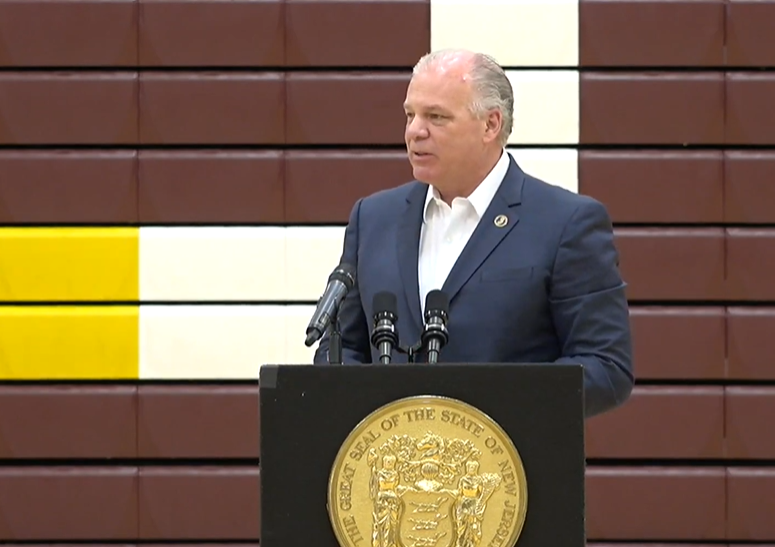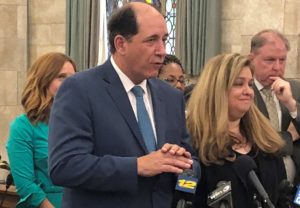Horizon Restructuring Bill Takes Center Stage in Trenton this Week

You’ve probably seen the commercials on television. Horizon Blue Cross Blue Shield, the largest health insurance company in New Jersey, attempting to simplify a controversial and complicated proposal to restructure its corporate model.
For those who may not know, Horizon, based in Newark, is a not-for-profit health service corporation. That charitable status comes with perks, as well as an understanding the 90-year-old company has a special obligation to not only New Jersey’s residents but also to the more than three million people it insures.
Horizon wants to turn its not-for-profit health services corporation into a not-for-profit mutual holding company owned by its members. Over the years, the company has been vigorously fighting for legislation that would help pave the way for that kind restructuring.
New Jersey State Assemblyman John McKeon, a Democrat, plans on introducing proposed legislation

Thursday that sets up a process for Horizon to apply to the Commissioner of the Department of Banking and Insurance in order to reorganize. The State Senate has also introduced a version of the bill, sponsored by Senate President Steve Sweeney and Senators Nellie Pou and Paul Sarlo.
Now, amid the devastating COVID-19 pandemic, where the need for adequate and affordable health care has been amplified, Horizon may be one step closer to making the ever-evolving plan a reality. Sources say the proposals are gaining traction in both the State Assembly and Senate, as well as with Governor Phil Murphy. While the Governor has not publicly commented on the proposed law, sources say it would provide a one-time $600 million budget plug at a time when Murphy desperately seeks to offset the impact of federal denials on his COVID-19-ravaged state. The timing coincides with the lead-up to his new year budget address.
“This is significant legislation because it is going to allow the state’s largest insurance company to keep premiums down and compete in the rapidly changing health care marketplace,” said Senator Sarlo, also a Democrat.
“This is the right thing for 3.6 million people in New Jersey, and it all comes down to healthier lives for policyholders and more affordable premiums,” McKeon said. “Their charitable missions remain exactly the same, adding one prong that promotes innovation. There are no shareholders. There is no one who is going to make a profit. Every dollar flows into a non-profit, benevolent corporation, falling under the oversight of the Attorney General’s Office.”
Thomas Vincz, Horizon’s Public Relations Manager, says the company’s current structure imposes restrictions and limitations that impede its ability to evolve, adapt and drive the kinds of innovations that keep health care costs under control.
“As a not-for-profit mutual, Horizon would have the flexibility to invest in new partnerships that create more connected and convenient care, provide tools for health care professionals to better coordinate care and improve quality, improve access to mental and behavioral health,” Vincz said.
Blue Cross Blue Shield’s Chairman of the Board Kevin Conlin told the State Assembly Horizon has kept furloughed workers on health insurance plans during the Coronavirus crisis but added that “COVID highlighted areas where limitations in our ability to invest in new partnerships and innovations slowed the delivery of important services.”
Horizon officials say the company wants to expand in a variety of areas, including telemedicine, reducing out-of-pocket drug prescription costs and providing behavioral and substance abuse help on the web and on mobile phone apps.
“It is evident COVID-19 changed our lives,” Conlin said. “Private equity and the large, publicly traded for-profit health insurers are moving into aggregate technology assets. Some have even moved into the provider space. Innovators and disruptors — companies like Amazon, Google, and Apple — see widespread opportunity in health care.”
But not everyone is buying Horizon’s argument. New Jersey Citizen Action Health Care Program Director Maura Collinsgru says by converting to a mutual holding company with multiple for-profit subsidiaries — the company is effectively becoming a for-profit stock company. She also says Horizon doesn’t need legislation to convert to a mutual holding company because there’s a 2001 law that clearly spells out the requirements for a conversion. One stipulation, she adds, requires Horizon to make a payment equal to the fair market value of its assets and charitable trust fund.
“Horizon, as of a 2018 end of year report filed with the DOBI, listed assets valued at approximately $7 billion,” Collinsgru said. “Horizon wants to circumvent the conversion law and instead guarantee a one-time payment of $600 million with another potential $650 million over 17 years. That money would go into the general budget and not be dedicated as required to improving the health care of New Jersey residents.
“Horizon contends they must undergo this massive ‘reorganization” in order to be competitive and innovative,” Collinsgru added. “Horizon is the largest provider of health coverage in the state. They insure and administer benefits for more than 3 million New Jersey residents, including the entire state health benefits plan. Their assertions about needing to change the law in order to buy heart monitors and other technology they can’t provide now is without merit. They can indeed provide any health service they see fit now. The only reason for legislative change is to ‘walk away’ with $7 billion.”
McKeon says everyone’s jumping to conclusions and that Horizon has paid its fair share and will continue to do so in the future.
“In 2007, New Jersey needed money — what they did was put a policy tax and they capped the policy tax at 12 and half percent,” McKeon said. “You don’t pay anymore unless you are Horizon. Because they have 47 percent of the people in the state, they pay policy tax of 40 to 50 million a year in addition to whatever everybody else pays. It was done to create a revenue stream. They will no longer pay that excessive tax beyond 12 and half.”
McKeon says Horizon will be required to provide annual payments to the state totaling over $1.25 billion over 18 years, including the initial contribution of $600 million.
Horizon’s been presenting fancy, positive talking points on line. However, other legislators are concerned.

“There are still parts of the legislation that I am uncomfortable with and could pose a problem in the future for policyholders,” said State Senator Joe Vitale, the chairman of the Health, Human Services and Senior Citizens Committee. “There’s a danger that if the value of the company is diminished over time because its resources are spread out to other investments — those investments or whatever profits are made — are not required to be returned to the underlying legacy company where the value is today.”
Opponents of the proposed law worry if Horizon loses money, premiums could go up. Horizon officials say the legislation keeps the company’s mission the same — to operate for the benefit of its members. Vincz says Horizon’s already proven it can operate several for-profit companies, including those that offer dental and vision plans, without passing high costs on to policyholders.
“Policyholders and the public remain fully protected by New Jersey’s laws and the Attorney General has broad authority over not-for-profit companies and charitable and benevolent entities,” Vincz pointed out.
“Everybody needs to take a deep breath, let’s look at the language and let's alleviate all of the concerns our progressive friends may have,” Sarlo said.
Democratic State Senator Loretta Weinberg has been going over the draft of the proposal with a fine-tooth comb and plans on asking a lot of questions. Horizon has also gone back-and-forth with the bill sponsors, making changes along the way. One clause prevents the company from laying off employees for at least two years.
New Jersey Appleseed Executive Director Renee Steinhagen, another opponent of the plan, complains

that “As a matter of public policy, it would be irresponsible of both the Legislature and the Governor to allow this legislation to be passed as it is — without adequately protecting the policyholders and the general public by refusing to require a charitable trust payment.”
Horizon would continue to operate the Horizon Foundation for New Jersey that has provided more than $53 million in grants to improve healthcare.
The public will have an opportunity to voice concerns. McKeon says two public hearings are scheduled in December. Then, the proposed law would go to the Assembly Appropriations Committee and to another public hearing before heading to the floor.
Former Assemblyman John Wisniewski (D-19), who ran unsuccessfully for governor in 2017, noted the unsettling fast-tracked nature of this particular bill.
"There's no reason the legislative process should be rushed," Wisniewski told InsiderNJ. "The structure of Horizon has been a public trust and opening a new business model raises a host of concerns. There is a lot of money and there a lot of agendas, and that is what is at the heart of this, which is the fact that Trenton is a transactional place where things happen for a reason. There's always quid pro quo.

"But it' more important now than ever, at a time when public trust has cratered to an all time low, for elected officials to maintain an obligation to rebuild the trust, and that is done not through a fast-tracked process but through proper deliberation and full disclosure. At its heart this legislation is illiberal, in that it takes quality healthcare and affordable rates and turns it into a for-profit entity, which appears to be walking away from the core principle."
Wisniewski was a member of the legislature when former Governor Jon Corzine unsuccessfully pitched his asset monetization scheme, which the assemblyman opposed, and in 2017 when then-Governor Chris Christie made an unsuccessful play to raid Horizon's reserves.
"In the case of Christie and Horizon, the opposition was worried that Christie would spend the money and get credit for it; it was not a philosophical disagreement but a political disagreement, and that's the problem we have with gaining trust," Wisniewski said. "Public resources should be used for the public good."
For its part, the New Jersey Education Association (NJEA) stopped short of opposing the bill, expressing a common reaction in the closing days of the legislative season.
"We are still analyzing this legislation," said Steven Baker, NJEA spokesman. "It’s a very complex bill with the potential for far reaching effects on health insurance for millions of New Jersey residents as well as on the state budget. Our analysis will be focused on determining whether the proposed change would benefit New Jersey residents, including our members and the families of our students. It is important to have ample open public hearings so that all concerns can be heard and all questions can be addressed.





